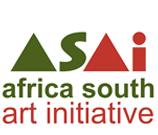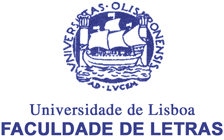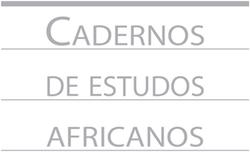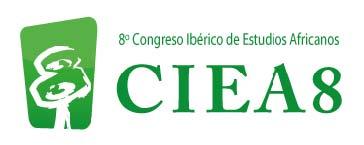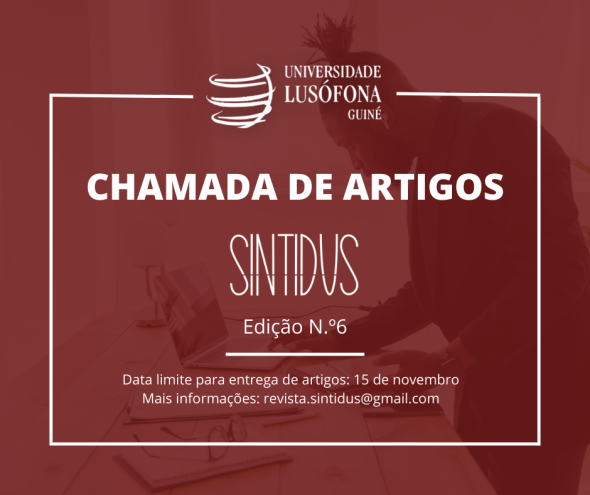
1 | Chamada para Artigos para o número 6
A Sintidus, revista de estudos científicos e interdisciplinares da Universidade Lusófona da Guiné anuncia a abertura para a submissão de trabalhos para o seu quinto número. Serão aceites trabalhos de qualquer área disciplinar e favorecidas abordagens que conjuguem várias lentes disciplinares para olhar a Guiné-Bissau. Serão aceites trabalhos inéditos que não tenham sido publicados noutro lado, artigos de investigação, comunicações curtas, ensaios fotográficos e resenhas críticas são os formatos esperados para submissão. A Sintidus será publicada em suporte físico e em formato digital.
A chamada para artigos estará aberta até 15 de Novembro de 2022. Os artigos poderão ser submetidos através de sintidus.revista@gmail.com ou entregues em suporte digital na sede da Sintidus na Universidade Lusófona da Guiné.
O primeiro número da Sintidus saiu online a 22 de Janeiro de 2018 e, desde então, a revista viu publicadas outros três números. Todas as edições e respectivos artigos estão disponíveis em acesso livre em http://sintidus.blogspot.com. O número 5 sairá no final de 2022.
2 | Instruções para Autores
Os artigos deverão ser escritos em português, em Times New Roman, tamanho 11, parágrafo duplo, margens de 2 cm, linhas numeradas à esquerda e páginas numeradas. As informações para cada tipo de artigo estão apresentadas abaixo. A estrutura geral dos trabalhos será título, resumo, palavras-chave, introdução, métodos, resultados, discussão, agradecimentos, referências bibliográficas. O título deverá ter no máximo 25 palavras e os resumos não devem ultrapassar 150 palavras. As palavras-chave devem ser indicadas depois do resumo e compreender 5 a 7 termos. Resumos em inglês e kriol (opcionais) podem ser enviados num documento à parte. O nome da(s)/do(s) autora(s)/autore(s) deve ser apresentado como irá aparecer no documento, sendo admitido um máximo de três nomes por autor. A ligação institucional da(s)/do(s) autora(s)/autore(s) deverá aparecer depois do nome. Autores independentes, ou seja, sem filiação institucional, podem identificar-se como investigadora, investigador ou artista independente, ou outro.
2.1 | Política de privacidade
A Sintidus adoptou a política de Open Access CC-BY-NC da Creative Commons (ver https://creativecommons.org/licenses/by-nc/4.0/deed.pt), definida pela necessidade de atribuição de autoria e impossibilidade de uso para fins comerciais. Assim, submetendo um artigo à Sintidus a/o autora(a) concorda com os termos da licença CC-BY-NC, o que significa que concorda que qualquer pessoa copie, distribua, reutilize o conteúdo do seu artigo livremente para fins não comerciais desde que a autoria e fontes originais sejam devidamente citadas.
2.2 | Tipos de manuscrito:
Artigo de investigação
Este formato corresponde à apresentação de um trabalho de investigação ou de revisão bibliográfica aprofundado. Deve ser apresentado no máximo em 30 páginas (Times New Roman, tamanho 11, parágrafo duplo, margens de 2 cm), incluindo todas as suas componentes, do título às referências bibliográficas.
Comunicação curta
Este formato corresponde à apresentação de resultados e análise preliminares e/ou contribuições de interesse imediato. Deve ser apresentado no máximo em 15 páginas
(Times New Roman, tamanho 11, parágrafo duplo, margens de 2 cm), incluindo todas as suas componentes, do título às referências bibliográficas.
Recensão
Trabalho de discussão crítica de um artigo ou livro publicado recentemente ou que se considere relevante para analisar determinada situação, contexto ou conceito actual. Deve ser apresentado no máximo em 10 páginas (Times New Roman, tamanho 11, parágrafo duplo, margens de 2 cm).
Ensaio fotográfico
Estes trabalhos devem focar-se nos aspetos visuais do tópico estudado e constituir uma série de fotografias/imagens que ilustrem um argumento, um conceito, uma história. O título e resumo devem seguir as instruções dadas acima, ao que se seguem a introdução, a série de fotografias e a conclusão. A introdução e conclusão devem perfazer um número máximo de 1000 palavras. Podem ser apresentadas até 10 fotografias numeradas (“Figura 1”). A cada fotografia deve ser anexado um texto de até 100 palavras que ilustra o que o autor pretende fazer notar com cada imagem. As fotografias devem ter resolução apropriada ao intuito do trabalho, sendo aconselhável as de alta resolução.
2.3 | Revisão dos manuscritos
A revisão dos artigos é duplamente anónima (double-blinded), ou seja, cada artigo é enviado a revisores que não terão acesso aos nomes dos autores, assim como os autores não terão acesso aos nomes dos revisores. O manuscrito deve garantir o anonimato dos autores no corpo do texto. A identificação dos autores aparecerá somente na página inicial do manuscrito (página 1), onde deve constar: título, nome dos autores, filiação dos autores, email de cada autor (ou pelo menos do autor correspondente) e agradecimentos. Esta página não será enviada aos revisores. O título deverá ser repetido na página 2, antes do resumo, seguido do resto do texto. O autor é livre de sugerir árbitros que considere terem experiência adequada para rever o trabalho submetido. A coordenação não fica contudo obrigada a seguir estas sugestões. Todos os manuscritos submetidos a deteção de plágio. Manuscritos com secções plagiadas não são admitidos para integrarem o processo de revisão ou para publicação.
2.4 | Referências bibliográficas
A lista de referências bibliográficas deve ser composta somente pelas referências efetivamente utilizadas no texto. A coordenação pode providenciar revisão da formatação das referências bibliográficas mas a exatidão sobre o seu conteúdo é da inteira responsabilidade das(s)/do(s) autora(s) e/ou autor(es) dos textos. O estilo de apresentação de citações e referências são semelhantes ao estilo da APA (American Psychological Association).
As referências utilizadas para citações indiretas referenciadas ao longo do texto devem aparecer na forma (Apelido(s), Ano), exemplo, (Indjai, 2005). No caso de o trabalho referenciado tiver sido escrito por dois autores deve usar-se um “&” entre os dois apelidos, e.g. (Indjai & Gomes, 2005). Caso o trabalho referenciado compreenda mais do que dois autores, cita-se apenas o primeiro autor seguido de “et al.”, e.g. (Indjai et al., 2005). No caso de citações diretas ou literais aplicam-se as regras acima sendo que terá de se adicionar a(s) páginas onde consta a informação citada, e.g. (Indjai, 2005, p. 5). Citações diretas com mais do que 30 palavras devem aparecer com espaçamento das margens de 4 cm e espaçamento simples entre linhas. Citações de citações são referidas como no exemplo (Indjai, 2003 como citado em Sanha, 2018).
As referências bibliográficas deverão ser organizadas por ordem alfabética e em função dos modelos seguintes:
Livros
[Apelido do autor(es)], [Inicial do(s) primeiro(s) nome(s)]. [(ano)]. [Título do livro]. [Local da publicação]: [Editora].
Por exemplo:
Mendy, P. M. K. (1994). Colonialismo português em África: A tradição de resistência na Guiné-Bissau (1879-1959). Bissau: Instituto Nacional de Estudos e Pesquisa.
Capítulos de livros
[Apelido do autor(es)], [Inicial do(s) primeiro(s) nome(s)]. [(ano)]. [Título do capítulo]. Em: [Inicial do(s) primeiro(s) nome(s)], [Apelido do editor] (Org.). [Título do livro]. [Local da publicação]: [Editora], pp. [Página inicial do capítulo]-[Página final do capítulo].
Por exemplo:
Descola, P. (1996). Constructing natures, symbolic ecology and social practice. Em: P. Descola, & G. Palsson (Org.). Nature and society: anthropological perspectives. Londres, Nova Iorque: Routledge, pp. 82-102.
Artigos
[Apelido do autor(es)], [Inicial do(s) primeiro(s) nome(s)]. [(ano)]. [Título do artigo]. [Nome da revista], [Volume]([Número]), [Página inicial do artigo]-[Página final do artigo].
Por exemplo:
Cruz, D. F. V., & Standaert, A. (1989). Estudos pedológicos em vales estuarinos com vista à construção de barragens orizícolas. Boletim de Informação Científica e Técnica,2(4), 1–8.
Teses
[Apelido do autor(es)], [Inicial do(s) primeiro(s) nome(s)]. [(ano)]. [Título da tese]. [Tipo de tese], [Universidade], [Local da defesa da tese].
Por exemplo:
Catarino, L. (2004). Fitogeografia da Guiné-Bissau. Dissertação de doutoramento, Instituto Superior de Agronomia, Universidade Técnica de Lisboa, Portugal.
Anais e Proceedings
[Apelido do autor(es)], [Inicial do(s) primeiro(s) nome(s)]. [(ano)]. [Título da comunicação]. [Título da Conferência]. [Cidade], [País], [dia de início]-[dia de fim] de [mês] de [ano].
Exemplo:
Cardoso, C. (2008). Sociedade civil, espaço público e gestão de conflitos: O caso da Guiné-Bissau. 12a Assembleia Geral do CODESRIA: Governar o Espaço Público Africano. Yaoundé, Camarões, 7-11 de Dezembro de 2011.
Leis ou Constituição
Lei nº [número de lei], de [dia] de [mês] de [ano] ([ano]). [Título da Lei]. [Cidade], [País]. Disponível em: [link] (Acedido a [dia] de [mês] de [ano])
Por exemplo:
Lei nº 9.984, de 17 de julho de 2000 (2000). Dispõe sobre a criação da Agência Nacional de Águas - ANA, entidade federal de implementação da Política Nacional de Recursos Hídricos e de coordenação do Sistema Nacional de Gerenciamento de Recursos Hídricos, e dá outras providências. Brasília, DF. Disponível em: http://www.planalto.gov.br/ccivil/Leis/L9984.htm (Acedido a 10 de abril de 2007)
[Título da Constituição e indicação do país]. ([ano]). [Cidade]. Disponível em: [link] (Acedido a [dia] de [mês] de [ano])
Por exemplo:
Constituição da República Federativa do Brasil de 1988. (1998). Brasília. Disponível em: http://www.planalto.gov.br/CCIVIL_03/Constituicao/Constitui%C3%A7ao.htm (Acedido a 10 de abril de 2007)
Artigos na Internet
[Apelido do autor(es)], [Inicial do(s) primeiro(s) nome(s)]. [(ano)]. [Título]. [Editora/Organização]. Disponível em: [Link] (Acedido a [dia] de [mês] de [ano])
Por exemplo:
Aston, B. (2015). Demonstration farms prove popular among Laikipia farmers. ALIN News. Disponível em: http://www.alin.or.ke/i/Demonstration%20Farms%20Prove%20Popular%20 Among%20Laikipia%20Farmers (Acedido a 12 de março de 2016).
Artigos de revistas ou jornais
[Apelido do autor(es)], [Inicial do(s) primeiro(s) nome(s)]. [(ano, [dia] de [mês])]. [Título do artigo]. [Nome da revista ou jornal], [Volume]([número]) [se houver], p./pp. [página ou páginas].
Exemplo:
Schwartz, J. (1993, 30 de Setembro). Obesity affects economic, social status. The Washington Post, pp. A1, A4.
2.4 | Outros elementos de formatação
Não devem existir mais do que três níveis de titulação: título, sub-título, infra-título.
Ao longo do texto, os títulos de textos, documentos, filmes, etc, devem ser apresentados entre aspas. Palavras noutra língua que não a do texto devem aparecer em itálico. Acrónimos podem usar-se após indicação por extenso.
Grandezas numéricas até dez, inclusive, devem ser apresentadas por extenso e as restantes em algarismo. Devem ser usadas medidas do sistema internacional (e.g. 10 km).
Notas de rodapé devem evitar ultrapassar as cinco linhas.
Todas as figuras, imagens, desenhos mapas, etc, devem ser acompanhadas de legenda em formato “Figura 1”, “Figura 2”, e assim sucessivamente, colocadas na linha que segue o elemento gráfico correspondente. Todas as tabelas devem ter uma legenda em formato “Tabela 1”, “Tabela 2”, e assim sucessivamente, cada uma posicionada na linha acima do elemento ao qual se refere.
Mais informações: sintidus.revista@gmail.com e em SINTIDUS.
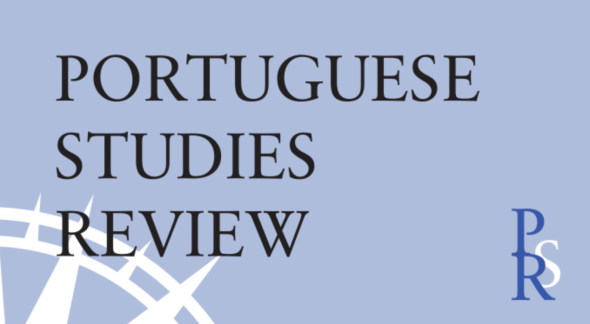

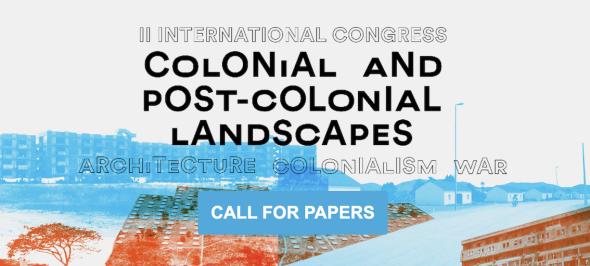

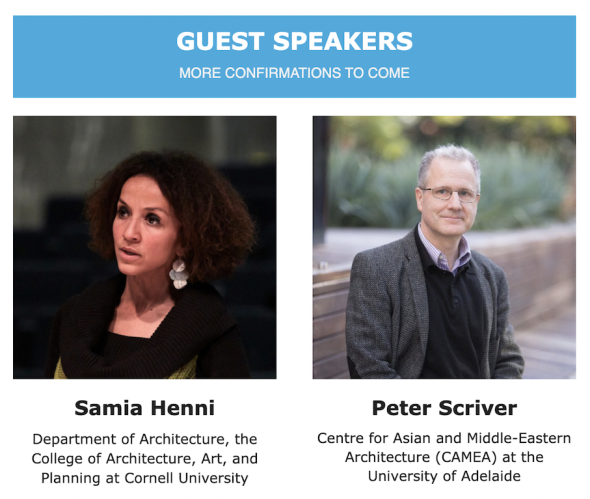
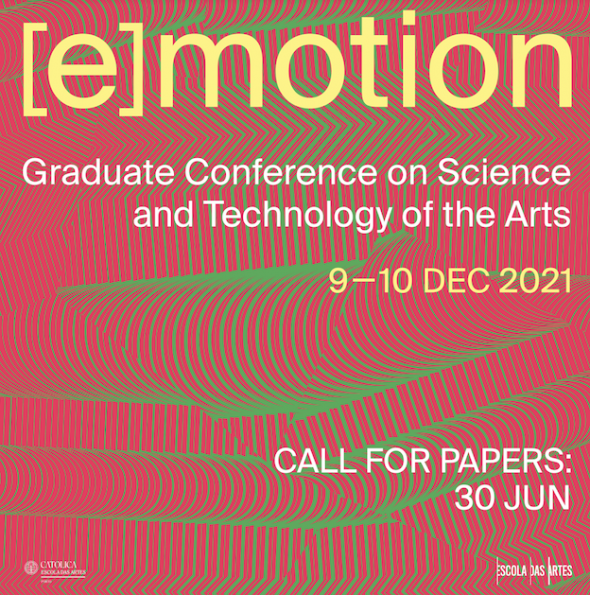
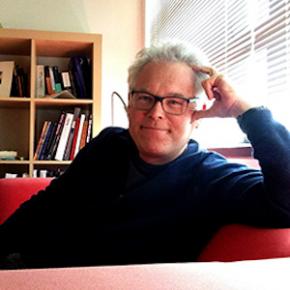 Doug Bailey
Doug Bailey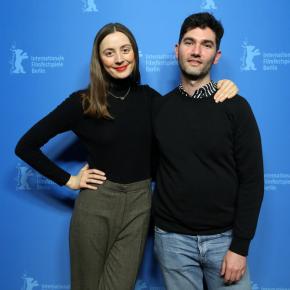 Sasha Litvintseva & Beny Wagner
Sasha Litvintseva & Beny Wagner





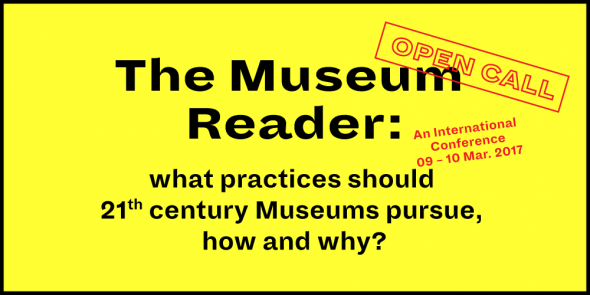

 – Borderlines: the making and unmaking of borders in Southern Africa.
– Borderlines: the making and unmaking of borders in Southern Africa.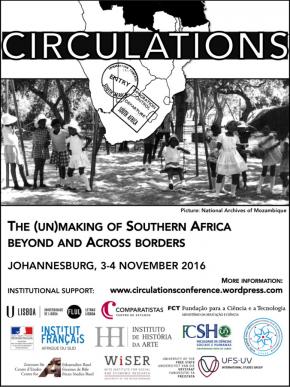 Between 3-6 November, Johannesburg will host the conference “The (un)making of Southern Africa beyond and across borders”.
Between 3-6 November, Johannesburg will host the conference “The (un)making of Southern Africa beyond and across borders”.



